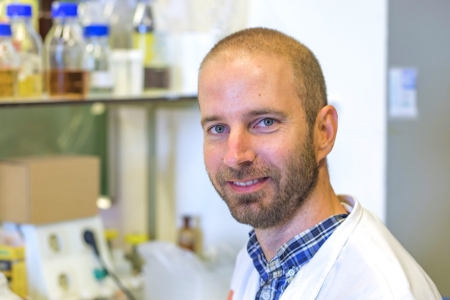The Fungal Genomics group is led by Robin Ohm and is part of the Microbiology lab at Utrecht University. The group takes a functional genomics approach to answer biological questions about fungal growth, development and pathogenesis. NWO awarded Robin Ohm a VIDI grant, which gives him the opportunity to extend his international team with two PhD candidates with bioinformatics expertise.
As Robin says: “Knowledge about Bioinformatics is vital to unravel the large data sets we work with in our field of Fungal Genomics. So the two PhD candidates that will work on the VIDI research need these skills too.”
Personal fascination
Robin Ohm earned his Master’s in Biology at Utrecht University, and a PhD on genetic research into mushroom-forming fungi. He then went to California to work for four years as a bioinformatics specialist at the Joint Genome Institute. As of 2014, he has been back in Utrecht, and with an ERC Starting Grant of 1.5 million euros he had the opportunity to set up his own fundamental research program. This year, NWO awarded Robin Ohm a VIDI grant to find out how mushrooms defend themselves against pathogens. Robin tells about his fascination: ”Mushrooms always used to fascinate me as a child. And during my studies, I found out about the many opportunities presented by fungi. For example, they can grow into a mushroom, but they can also produce antibiotics or biofuels.”
Multi-disciplinary research
With his VIDI grant Ohm aims to answer the question: “How does the immune system of multi-cellular fungi with an entire underground network function?”. In order to gain more insight into the mushrooms’ immune system, Ohm uses the model system: Schizophyllum commune. “This species of mushrooms achieves good results in the lab. Mushrooms have around 15,000 genes, and we can’t study them all in detail, so we need to use both biological- and bioinformatics knowledge. As a biologist, I use modern laboratory technologies to see which genes are more ‘activated’ in diseased mushrooms, both in our model system and in commercially viable species. We can then assume those types of genes are important for protecting against diseases. Once we know that, we can use our expertise in bioinformatics to narrow the number of candidate genes by looking at which genes are also present in other species of mushrooms. We can then go back to the lab to study the actual effect that the genes’ interactions have.”
Sustainable food supply Valuable research community
Ohm explains that the application of his VIDI research may contribute to a sustainable food industry. Increasing the production of edible mushrooms can provide the world with a high-quality supply of food, but doing so would require improved knowledge of the immune system.
“Mushrooms grow great on cheap, low-quality material. That makes them very interesting to the food industry. Unfortunately, pathogens like bacteria or other fungi often cause infections, and the harvest – and growers’ profits – simply melt away. Greater insight into the mushrooms’ immune system could make mushrooms less susceptible to pathogens in the future.”
Valuable research community
“Important insights are shared within the Utrecht Bioinformatics Center, for example with the Bioinformatics group of Berend Snel and the Plant Microbe Interactions group of Corné Pieterse. I expect that we will greatly benefit from the research on plant diseases, since there is a large overlap in the techniques that we will use.”
Besides the ERC and VIDI research projects Ohm cooperates in national and international research as well. The food spoilage fungi project with prof. Han Wösten is one of them and aims to answer why some fungi are resistant to pasteurization or other preserving agents.
More information:

